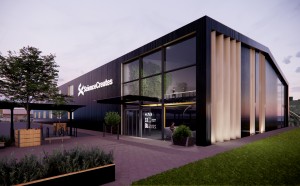Bristol is to get a new £8.5m incubator to nurture spin-out companies working in the fast-growing quantum, biotech and AI sectors – the latest in a series of hubs in the city aimed at creating the next generation of high-potential businesses.
Called OMX, it will be opened next year by the University of Bristol and city-based deep tech organisation Science Creates, which already operates two similar incubators in Bristol.
OMX, pictured, will provide capacity to incubate around 275 new companies in a refurbished industrial unit close to the university’s new Temple Quarter Enterprise Campus, which is now under construction on land near Temple Meads railway station.
The 30,000 sq ft hub will provide state-of-the-art facilities including wet-labs, ducted fume cupboards, a dedicated AI server capability connectivity and high-speed internet and ultra-fast computer networking geared towards spin-outs making the next groundbreaking discoveries in quantum and engineering biology.
Science Creates, which opened its first incubator in nearby St Philips in 2017, has since supported more than 100 deep tech start-ups and spin-outs.
Its facilities provide essential research and development space and support to some of the UK’s most promising quantum and biotech companies, including QLM Technology – a start-up on a mission to help organisations reach net-zero emissions - Scarlet Therapeutics, which has created new technology to develop red blood cells that carry additional proteins, and Imophoron, a University of Bristol biotech start-up developing a novel, next generation rapid-response vaccine platform.
OMX will increase Science Creates’ incubator facilities by around 66% to 75,000 sq ft.
While the University of Bristol will lead on the joint venture, the incubator will be open to spin-out companies from other West of England universities and beyond.
Major research programmes in the region’s universities have created a large pipeline of potential spin-outs in critical areas, such as engineering biology, quantum technology and cyber security.
University of Bristol executive director for research, enterprise and innovation, Dr Jon Hunt, described the university was a great powerhouse for spin-outs.
This success is attributable to excellent research by world-class academics combined with a high-quality research commercialisation team and a vibrant, entrepreneurial ecosystem,” he said.
“The new OMX incubator will help create the next generation of deep tech spin-outs, in quantum, cyber, engineering biology and much more. I hope and expect many of these companies will thrive and grow to help us deliver on our mission to make a positive impact locally, nationally, and globally by addressing society’s greatest challenges.”
Some £4.75m of the funding is coming from the Research England Development (RED).
Dr Hunt added: “We could not do this without the support of Research England, who share our vision for a vibrant entrepreneurial regional ecosystem that supports university commercialisation to create great spin-outs that compete and win in global markets.”
The project will build on Bristol’s impressive success in developing an ecosystem where spin-out businesses can thrive.
The University of Bristol and Science Creates have worked together since 2015, and an independent impact report on the collaboration showed, as of this April, it had helped create 370 jobs and added £125m each year to the UK economy.
Science Creates founder Dr Harry Destecroix – who also launched pharma firm Ziylo, one of the University of Bristol’s most successful deep tech spin-outs – said: “We founded Science Creates in 2015, just one year after spinning out Ziylo, because the biggest barrier we faced was access to advanced research facilities.
“We also wanted to find people who understood the unique challenges deep tech spin-outs face.
“Being part of only 0.3% of UK companies that are spin-outs, we decided to do something about it.
“We have been working with the University of Bristol to help improve the conditions for deep tech spin-outs for nearly a decade. We are delighted to be working on our third deep tech incubator together.”
He said UK spin-outs were and will be driving the fourth industrial revolution.
“All we want to do is help world-class engineers and scientists who have discovered important technological breakthroughs, to build impactful deep tech companies,” he added.
“This will improve human health and the health of our planet. This additional physical infrastructure will allow deep tech companies to scale and emerge.”
Bristol also has a growing cluster of engineering biology businesses that are developing breakthroughs in areas such as cell therapies, vaccines, synthetically-produced red blood cells, and new drug platforms to combat antimicrobial resistance.
The city is also renowned for pioneering the commercialisation of quantum technology, with spin-out companies developing new approaches to quantum computing systems and software, sensors with unprecedented precision, and communications for ultra-secure networks.
The University of Bristol’s collaborative work in this sector has led to a third of the UK’s quantum technology start-ups coming from the city, with these companies employing more than 330 people in highly-skilled jobs.
The region’s cyber security cluster is also of national significance, with more than 600 cyber SMEs. Businesses in the sector can work closely with government agencies such as GCHQ and the MoD as well as providing products for businesses in any markets.
As well as its two Bristol research facilities in Bristol, Science Creates also owns a national early-stage deep tech venture capital arm, SCVC, which was founded in 2020, the educational outreach charity Science Creates Outreach, founded last year, and Science Creates Accelerators, which launched this year with UK Research & Innovation.
SCVC venture partner John Williams, who is also an exited founder of Bristol-Tokyo AI company Kudan, said: “Science Creates’ deep tech members are rapidly adopting AI across their operations.
“AI will play a huge role in every aspect of deep tech in the future. It’s fantastic to see the diverse set of companies across the Science Creates ecosystem, from life sciences to quantum and semiconductors, beginning to adopt it both in their core technologies and to help scale their businesses.
“This major network overhaul will ensure the security, connectivity and bandwidth is there to directly connect to powerful external AI services, such as OpenAI or the recently announced £225m investment to create the UK’s most powerful supercomputer in Bristol.”
Bristol’s science and tech ecosystem will also be boosted by the opening of Projekt, the South West’s largest commercial innovation hub in 1 Temple Way, better known as the former Bristol Evening Post building.
London property investment firm Mission Street plans to redevelop the 145,000 sq ft building to accommodate a wide range of innovation uses, including wet labs, dry labs, offices and more than 7,000 sq ft of shared collaborative space.
No date for Projekt’s launch has been announced.





























